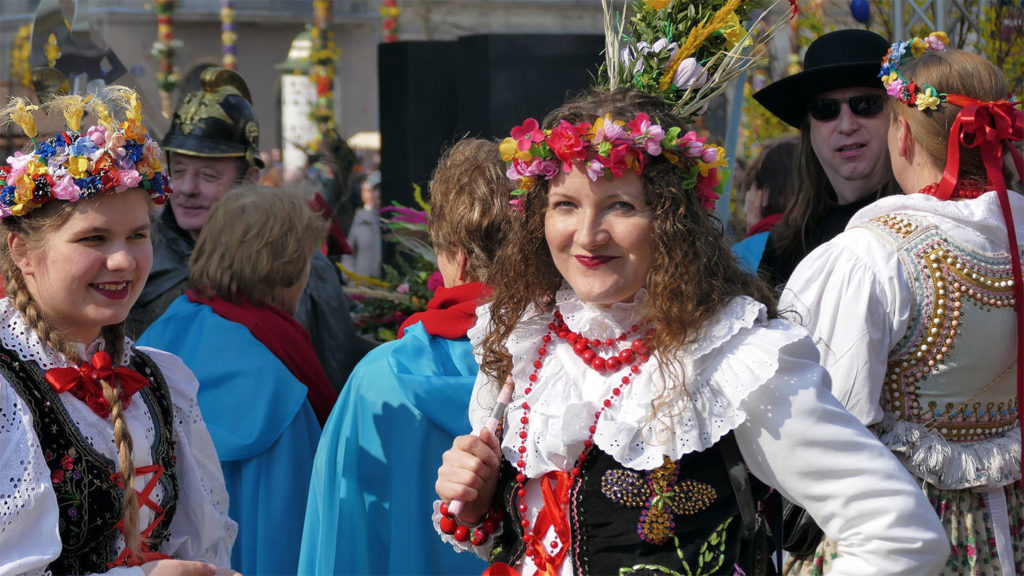Recently updated on March 3rd, 2025 at 03:21 pm
From drowning ‘winter’ to getting hitched twice, Polish traditions and customs often border on the bizarre but are certainly a highlight to discover.
The drowning of Marzanna
On the first day of spring, Polish celebrate the departure (or demise) of winter by the ‘Drowning (and sometimes burning) of Marzanna’. This tradition is rooted in the pre-Christian sacrificial rites of Slavic Pagans. Because of its origin, many over the years have tried to put an end to this tradition, unsuccessfully.
Marzanna was the goddess who personified winter. On this day, locals create her likeness using straw, old clothing and even accessories like a headscarf. They then literally throw ‘winter’ into a lake or a river to drown. The practice is symbolic for sending the winter away and preparing nature for spring and its rebirth. Often, singing or the reciting of old verses accompany the procession: “Marzanna, Marzanna, swim across the seas. Let flowers bloom, and fields turn green”.
Leaving an empty chair on Christmas eve
Polish are very proud of the traditional hospitality they may extend to a stranger who turns up at their door on Christmas eve (unlikely to happen, but not impossible). There is a lot of debate as to the origins of this custom, but three different explanations emerge:
Pagan rite
Despite their religious beliefs, several Polish traditions are rooted in Pagan rites. One celebrates an Obiat (a feast) in memory of the deceased. The host leaves an empty chair for the deceased and sweeps it away before everyone sits at the table to excuse the soul who isn’t there.
The Bible
Another explanation is rooted in the New Testament. In the scriptures, the Holy Family was en route to Nazareth when the Virgin Mary went into labour, forcing the family to find shelter. Consequently, Catholic Polish believe one must always be ready to accept an unexpected guest, never turning away anyone in need.
January uprising
The last explanation is more recent. In 1863, there was an uprising triggered by the forced enlistment of Polish men into the Russian Army. Those caught rebelling were deported to Siberia. The Polish leave the chair open in the hope that these brave men would return.
Regardless of whether these historical events have influenced the generous hospitality of the Polish, their warm, welcoming nature is one of the most treasured of Polish traditions.
Kanapki, the open sandwich


Polish only know one way to make and eat their sandwiches and that is open. The humble open sandwich was created as far back as medieval times. At the time, hungry Polish would use a thick slice of bread as a plate and then eat it.
Sounding distinctly like canapé, the Polish version of the open sandwich, known as kanapki, only appeared at the end of the 19th century. Several centuries on, they endure as a favourite Polish culinary custom. The Polish also make a different version of these open sandwiches, however. These smaller sandwiches, called tartinki, are quite possibly responsible for transforming parties in Poland from seated affairs into standing ones.
Large or small, the Polish open sandwich will include pretty much whatever you have lying in your fridge – cheese, lettuce, tomato slices, egg, dill, whatever.
Poprawiny, a second wedding party


It’s the best day of someone’s life, so why not celebrate twice? The Polish can certainly teach us a thing or two about getting hitched to the same person on more than one occasion. Poprawiny means starting the wedding party all over again. And sometimes, the Polish even push these celebrations out for a week.
RELATED CONTENT: Poland travel guide – everything you need to know
Śmigus Dyngus, Wet Monday


If staying dry is your preferred state of self, don’t visit Poland on Wet Monday. The whole country follows an age-old tradition which resembles one big water fight. This is one of the Polish traditions linked to Christianity, whereby splashing water is considered a blessing. Moreover, Wet Monday celebrates the arrival of spring and the future of a relationship. The Polish believe the girl who gets the most soaked in the celebration will be the first to marry.
Sto Lat, a birthday blessing
In Poland, no-one would dream of wishing their friend a good year on their birthday. Why? Because one year is not nearly enough. It is a Polish tradition to offer the birthday boy or girl 100 years of good wishes, good health and long life.
Tłusty Czwartek, Fat Thursday


If you happen to visit Poland the day before Lent, take a gander at the snaking queues outside every bakery. This most delicious of Polish customs offers one last chance to overindulge on anything and everything sweet which the largely Catholic population foregoes for Lent. Popular sweet treats, especially loved on this day, are Pączki, Polish-style doughnuts, and Faworki, otherwise known as angel wings, which are crispy pieces of pastry dipped in sugar.
Zaduszki, All Souls Day
Every year on the night of 2nd November, the Polish people pay their respects to their late friends and relatives by lighting candles in cemeteries across Poland. Although sad, it is a remarkable sight to see and experience.
Often rooted in religion, Polish traditions and customs remain as strong today as they did centuries ago. The Polish have a deep respect for their past and a pragmatic outlook on their future, which you’ll discover in great depth during your next visit to Poland.
GET INSPIRED BY: Best of Poland
Did we miss any of your favourite Polish traditions? We’d love to hear how you embraced the myriad of Polish customs you encountered on your last visit. So, share them in our comments below…